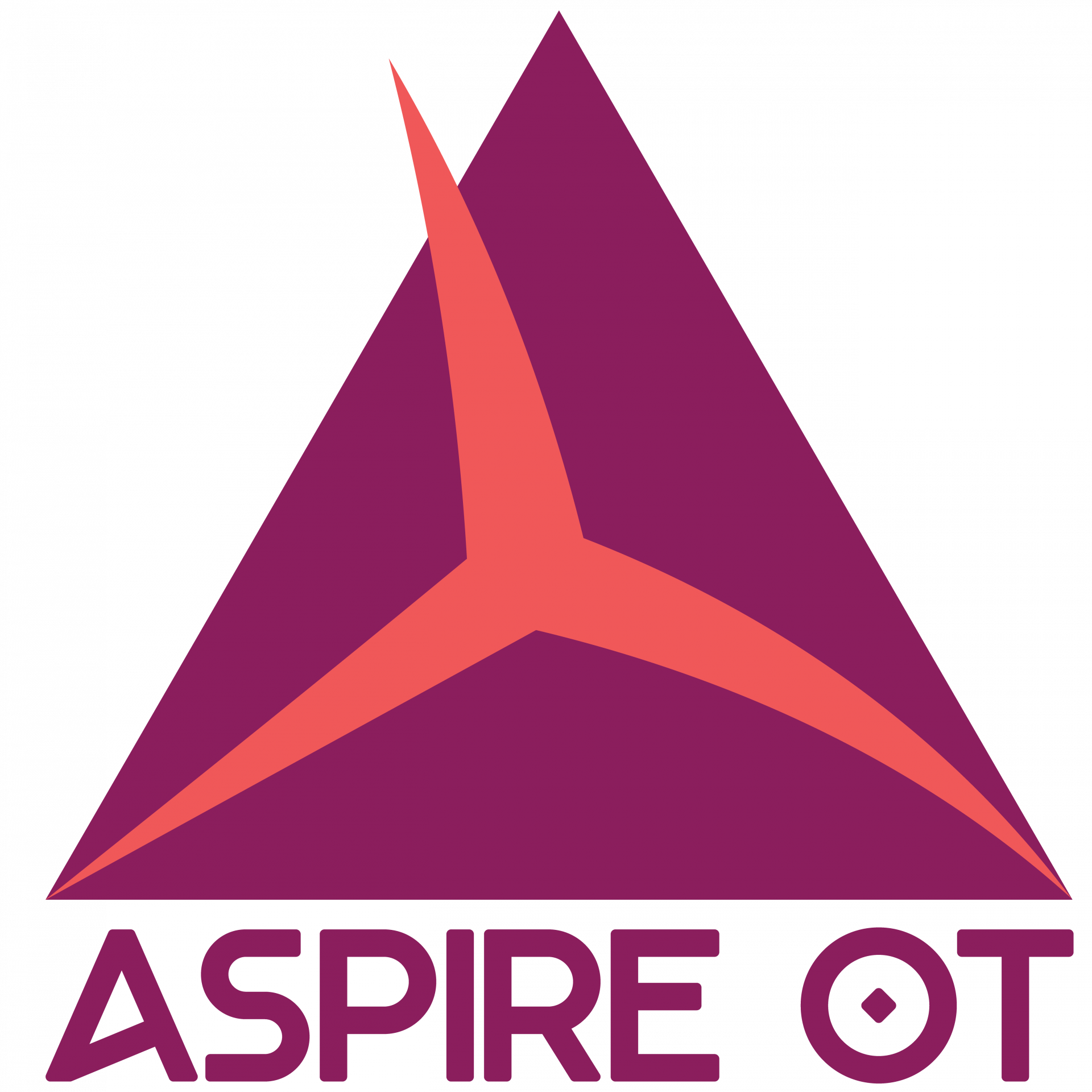
Welcome to guest blogger:
Cara Harman OTD, OTR/L
Aspire OT loves to support OTs, OTAs and students who are making a difference for clients and the profession.
This week's guest blogger is Cara Harman, OTD, OTR/L. She is an occupational therapist in Atlanta, Georgia, with a focus on neurorehabilitation, hand therapy, and clinical driver evaluations. In acknowledgment of Cara's steadfast dedication to her Atlanta community and the state of Georgia, the Georgia Occupational Therapy Association (GOTA) proudly named her the OT Practitioner of the Year for 2023.
Why are OT practitioners ideal professionals to complete driving evaluations and training?
Occupational therapists are skilled in providing individualized services to address functional safety, efficiency, and independence in meaningful occupations. For many, driving constitutes such a meaningful occupation. Occupational therapists and occupational therapy assistants focus their interventions on participation in occupations or everyday life activities. This includes any meaningful activity that a person wants to accomplish, such as school, work, the gym, attending sporting events, and spending time with family or friends. For many individuals, driving provides access to these meaningful occupations.
As noted above, driving is a common and valued instrumental activity of daily living (IADL) for many individuals. However, driving also holds a unique status as one of the most hazardous and complex routine tasks that individuals undertake daily. Medical professionals are often confronted with questions from patients about when they can return to driving after illness or injury. This is a difficult question for many healthcare providers as they often have a limited understanding of factors related to driving and may not feel comfortable making decisions about whether a person is safe to drive. However, as occupational therapists specializing in the area of driver rehabilitation, we have firsthand experience working with individuals to determine fitness to drive, and we understand the significant need for expanded services in this unique field. Driving is an intricately woven activity that demands the harmonious interplay of various sensory, motor, and cognitive functions. A comprehensive driving evaluation can pinpoint and address any potential shortcomings, thereby enhancing overall road safety. Occupational therapists are skilled and trained in their holistic background to help address this essential service to the community.
Why is it important for occupational therapists to address driving barriers?
Research shows that driving cessation limits independent community mobility, and studies indicate that it is linked to depressive symptoms, decreased quality of life, and poorer overall health, especially in older adults. Regrettably, the accessibility of these invaluable evaluations encounters substantial barriers. Fear is often one of these barriers, exemplified by patients apprehensive about potential license loss or testing anxiety. Additionally, healthcare providers often lack awareness of the benefits offered by driving rehabilitation programs and face challenges in acquiring the necessary training. Long wait times for evaluations, absence of local programs, assessments conducted in unfamiliar settings, and cost-related issues further compound the difficulties. However, while insurance providers may not designate driving as a 'medical necessity,' we, as clinicians, possess the capacity to make a valuable contribution in this regard. Clinical driver evaluations, when conducted by OTs/PTs, are covered by most insurances, effectively halving the cost for patients. It's worth noting that the behind-the-wheel test, comprising the second half of a comprehensive driving evaluation, isn't covered by any medical insurance. Nonetheless, the financial burden is significantly alleviated through insurance coverage for the initial phase of the evaluation. In practical terms, trained generalist OTs/PTs can conduct these evaluations in outpatient settings with minimal equipment (covered by most insurances) and subsequently refer patients for the on-road or behind-the-wheel evaluation. This coordinated approach ensures tailored care for individuals with diverse needs, while optimizing insurance coverage and reducing wait times for the overall evaluation process.
How can I get involved?
Barber’s Driving School has developed a 10-hour CEU course on Clinical Driving Evaluations to train generalist OTs in providing this essential service for their community. The course is led by experts in the industry, including certified driver rehab specialists (CDRS), professors, seasoned driving instructors, and generalist OTs.
Over the past two years, the CODE team has been conducting a study to obtain evidence-based research to build modules and training for clinicians, as well as educating OT students to provide quality clinical driving evaluations. The purpose of the research is to identify and summarize research articles that may apply to each of the four parts of the Clinical Evaluation (i.e., Sensory System, Mental Health, Physical Health, and Behavioral Health), as these all relate to driving. The goal is to provide a documented research foundation to support the assertion that CODE–CCDE is a research-based program and to develop training programs based on the research. Topics of interest may include aging, major diseases of concern, Alzheimer’s and other dementia diagnoses, Parkinson’s, stroke, amputation, TBI, and other diseases and illnesses that would require a driver evaluation. The training modules are designed for clinicians to administer and interpret assessments used for driving evaluations, as well as all the information related to the clinical driving evaluation process, including common diagnoses and impairments impacting driving fitness, the CODE-CCDE software, assessment tools, and interventions for various conditions including mental, physical, and behavioral health.
The CODE (Certified Older Driving Evaluation) – CCDE (Certified Comprehensive Driving Evaluation) program is holistic in its approach, not only in terms of the evaluation but the entire program, including marketing, software, and the customer/patient experience. CCDE is tailored for drivers under the age of 65 who would benefit from a driving evaluation to determine their ability to return to driving after illness or injury. CODE is tailored for patients 65 and over with concerns due to aging. Clients can self-refer or be referred by family, physicians, or law enforcement officers. Hospitals and clinics with trained therapists complete the clinical portion of the evaluation and then are referred for the behind-the-wheel assessment. As previous research has shown, the behind-the-wheel assessment is the gold standard for assessing driving fitness, and it is crucial for these providers to be extensively trained for this process. We are very excited about the CODE-CCDE program and hope that this training will assist you in providing this much-needed service in the community.
This week's guest blogger is Cara Harman, OTD, OTR/L. She is an occupational therapist in Atlanta, Georgia, with a focus on neurorehabilitation, hand therapy, and clinical driver evaluations. In acknowledgment of Cara's steadfast dedication to her Atlanta community and the state of Georgia, the Georgia Occupational Therapy Association (GOTA) proudly named her the OT Practitioner of the Year for 2023.
Why are OT practitioners ideal professionals to complete driving evaluations and training?
Occupational therapists are skilled in providing individualized services to address functional safety, efficiency, and independence in meaningful occupations. For many, driving constitutes such a meaningful occupation. Occupational therapists and occupational therapy assistants focus their interventions on participation in occupations or everyday life activities. This includes any meaningful activity that a person wants to accomplish, such as school, work, the gym, attending sporting events, and spending time with family or friends. For many individuals, driving provides access to these meaningful occupations.
As noted above, driving is a common and valued instrumental activity of daily living (IADL) for many individuals. However, driving also holds a unique status as one of the most hazardous and complex routine tasks that individuals undertake daily. Medical professionals are often confronted with questions from patients about when they can return to driving after illness or injury. This is a difficult question for many healthcare providers as they often have a limited understanding of factors related to driving and may not feel comfortable making decisions about whether a person is safe to drive. However, as occupational therapists specializing in the area of driver rehabilitation, we have firsthand experience working with individuals to determine fitness to drive, and we understand the significant need for expanded services in this unique field. Driving is an intricately woven activity that demands the harmonious interplay of various sensory, motor, and cognitive functions. A comprehensive driving evaluation can pinpoint and address any potential shortcomings, thereby enhancing overall road safety. Occupational therapists are skilled and trained in their holistic background to help address this essential service to the community.
Why is it important for occupational therapists to address driving barriers?
Research shows that driving cessation limits independent community mobility, and studies indicate that it is linked to depressive symptoms, decreased quality of life, and poorer overall health, especially in older adults. Regrettably, the accessibility of these invaluable evaluations encounters substantial barriers. Fear is often one of these barriers, exemplified by patients apprehensive about potential license loss or testing anxiety. Additionally, healthcare providers often lack awareness of the benefits offered by driving rehabilitation programs and face challenges in acquiring the necessary training. Long wait times for evaluations, absence of local programs, assessments conducted in unfamiliar settings, and cost-related issues further compound the difficulties. However, while insurance providers may not designate driving as a 'medical necessity,' we, as clinicians, possess the capacity to make a valuable contribution in this regard. Clinical driver evaluations, when conducted by OTs/PTs, are covered by most insurances, effectively halving the cost for patients. It's worth noting that the behind-the-wheel test, comprising the second half of a comprehensive driving evaluation, isn't covered by any medical insurance. Nonetheless, the financial burden is significantly alleviated through insurance coverage for the initial phase of the evaluation. In practical terms, trained generalist OTs/PTs can conduct these evaluations in outpatient settings with minimal equipment (covered by most insurances) and subsequently refer patients for the on-road or behind-the-wheel evaluation. This coordinated approach ensures tailored care for individuals with diverse needs, while optimizing insurance coverage and reducing wait times for the overall evaluation process.
How can I get involved?
Barber’s Driving School has developed a 10-hour CEU course on Clinical Driving Evaluations to train generalist OTs in providing this essential service for their community. The course is led by experts in the industry, including certified driver rehab specialists (CDRS), professors, seasoned driving instructors, and generalist OTs.
Over the past two years, the CODE team has been conducting a study to obtain evidence-based research to build modules and training for clinicians, as well as educating OT students to provide quality clinical driving evaluations. The purpose of the research is to identify and summarize research articles that may apply to each of the four parts of the Clinical Evaluation (i.e., Sensory System, Mental Health, Physical Health, and Behavioral Health), as these all relate to driving. The goal is to provide a documented research foundation to support the assertion that CODE–CCDE is a research-based program and to develop training programs based on the research. Topics of interest may include aging, major diseases of concern, Alzheimer’s and other dementia diagnoses, Parkinson’s, stroke, amputation, TBI, and other diseases and illnesses that would require a driver evaluation. The training modules are designed for clinicians to administer and interpret assessments used for driving evaluations, as well as all the information related to the clinical driving evaluation process, including common diagnoses and impairments impacting driving fitness, the CODE-CCDE software, assessment tools, and interventions for various conditions including mental, physical, and behavioral health.
The CODE (Certified Older Driving Evaluation) – CCDE (Certified Comprehensive Driving Evaluation) program is holistic in its approach, not only in terms of the evaluation but the entire program, including marketing, software, and the customer/patient experience. CCDE is tailored for drivers under the age of 65 who would benefit from a driving evaluation to determine their ability to return to driving after illness or injury. CODE is tailored for patients 65 and over with concerns due to aging. Clients can self-refer or be referred by family, physicians, or law enforcement officers. Hospitals and clinics with trained therapists complete the clinical portion of the evaluation and then are referred for the behind-the-wheel assessment. As previous research has shown, the behind-the-wheel assessment is the gold standard for assessing driving fitness, and it is crucial for these providers to be extensively trained for this process. We are very excited about the CODE-CCDE program and hope that this training will assist you in providing this much-needed service in the community.
Clinical Driver Evaluation Course for only $195
Save an extra 20% off with code ASPIREOT20
Occupational Therapy Courses to Recharge Your Practice
Aspire OT is a different kind of CEU company, owned by an OT & OTA.
Aspire OT is an AOTA Approved Provider
&
Approved Sponsor

Don't Miss A Thing!
Follow us on social media to stay up to date on all of our latest postings.
Join our newsletter
Get weekly updates on new blog posts, webinars, on-demand courses and more right in your mailbox.
Thank you!


